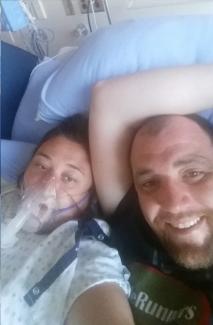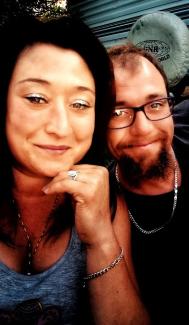
October 1979: I was born at 26 weeks in, weighing 1lb at birth. My lungs never fully developed. As a child I was prone to chest infections, and a chest cold would knock me down for weeks. As I matured, I always knew I was different as I could never breathe properly after any type of exertion.
2012: I was celebrating my daughters 2nd birthday. I woke up that morning with shortness of breath, wheezing and a deep cough. I somehow managed to get through the day before my lips turned blue and I was too fatigued to function. I was taken by ambulance to the ER. I had a severe fever, chills, extreme weakness, and I was very confused. I spent 2 weeks in hospital. Upon discharge I was told that I had a flu that needed to run its course. Looking back, I don't know if I ever recovered from that hospital bout. Shortly after discharge I was diagnosed with stage 3 chronic obstructive lung disease.
July 2015 (Vancouver, BC): I woke up shaking and sweating profusely, and didn’t have the energy to get out of bed. I was shocked to see I had patches of discolored skin. I was restless, yet so tired, and I had heart palpitations like never before, and I was confused and agitated. I was taken by ambulance and admitted to the ER. I don't remember much except I was asked to call my husband because I was extremely sick. I never made that phone call as my blood oxygen levels dropped and my lungs collapsed.
Late August 2015: I woke up in intensive care unit (ICU). I like to joke with the doctors and tell them I really must have needed my beauty sleep. My experience in ICU was horrific. Illness and infection took over my body. Sepsis, septic shock, pneumonia... I still don’t know everything that happened to me health wise! I had to be intubated, tube fed, all my organs failed, and I had a fever that wouldn't break. I must have been a whirlwind of chaos as almost immediately I was restrained.
My memories are so vivid, it's almost as if I'm watching a movie on repeat. Waking up I was so confused. I remember being so thirsty, but was not allowed to drink due to intubation. That was the longest 24 hours of my life. I couldn't speak or move. I remember lying in the hospital bed wondering why my ears were ringing and people sounded so muffled when speaking. My hands, feet and lower legs were numb, tingling, burning. I remember desperately trying to ask for help but I was frozen in fear. I tried to scream that I had been sexually assaulted and needed to report what had happened. I don't recall when I was able to finally speak, but besides me telling my loved ones that I died multiple times, I told anyone that would listen in my ICU room what I believed happened.

Slowly, I started to gain my strength. I went to rehab and worked hard to make my lungs stronger and re-learn to walk. The psychologists I've seen tell me my thoughts were due to heavy sedation. Those thoughts still consume me daily and still feel the events were very real. Doctors tell me I will eventually get over it. 4 years later, I still haven't.
Following my extended ICU stay, I came home a very broken woman; emotionally, physically, mentally and spiritually. I left the hospital strong enough to walk with a walker. Little did I know this was just the beginning of the biggest challenges of my life. The first year post-sepsis I was on 62 different medications! For a long time I felt alone and thought that I was crazy. The new me post ICU was so different. Upon discharge no one told me life as I knew it would be completely different.
4 years post-ICU (Gladstone, MB): I still suffer from Post-Sepsis Syndrome (PSS). My daily struggles include fatigue (I schedule my life around my naps), lack of mobility (due to muscle weakness, joint pain) and coordination problems (I drop things all the time and can no longer do simple tasks, like opening a jar, with ease). I still struggle to stand or sit for long periods of time. I’ve also experienced loss of sight and hearing, changes to my sense of taste, recurring hair loss, skin problems (extreme dryness, acne), my feet are untouchable, and blood sugar levels constantly skyrocket. In 2018, I was diagnosed with PTSD and high levels of anxiety as well as depression. I struggle to this day to make sense on what happened. I have lived with insomnia since waking up from my ICU nap.
The worst part of my PSS is how my brain has been affected. My memories have become vague (I don't recall my wedding or the birth of my beautiful daughter), I have trouble remembering names and numbers, and I struggle to find words and keep up with conversations. I repeat myself saying the same things to the same people, over and over again. I loved immersing myself in books - but I can't anymore as I have to read each page multiple times to get my mind to comprehend what I’m reading.
It is overwhelming and makes for long and difficult days. When I was discharged from the hospital, I had no idea I had sepsis/septic shock. I have only recently learned the symptoms I'm experiencing are not just happening to me but others who have lived through sepsis.
Sepsis is a monster. I would never wish this illness upon anyone. Doctors, nurses and other medical professionals need to be educated on the signs and symptoms upon the patient’s arrival. They also need to prepare the patients (and patient’s family) upon discharge of what they will be experiencing. Supports need to be put in place for families, friends and the patient.
I hope my story can help you or a loved one through this journey that is sure to be a difficult path to walk.
With love and healing vibes,
Angie N.
